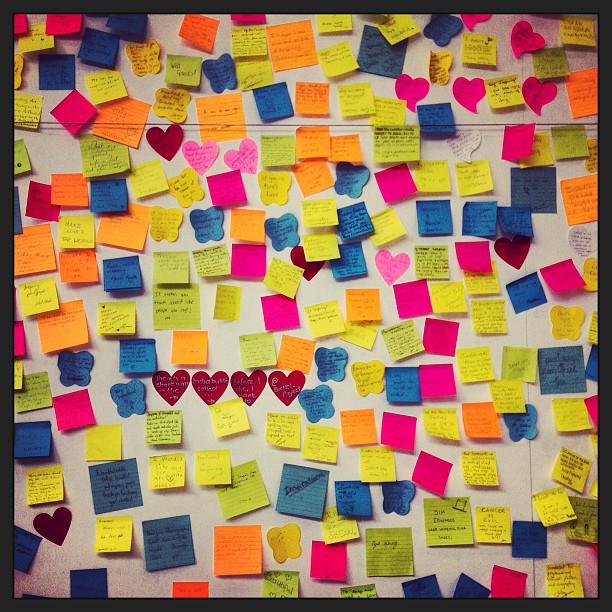Hi, I’m Sally and I’m a civil servant. Over the past few months, since I’ve joined the Cabinet Office, I’ve heard a lot about GDS. Glance down the Cabinet Office or Civil Service Twitter feeds and I guarantee it won’t be long until you see a tweet highlighting their work.
But what is it like to work there? And how do you run a tech organisation that’s part of government?
I spent two weeks in GDS Operations finding out.
Show the thing

GDS aims to be transparent – but their windows aren’t always. That’s because of the sticky notes and posters displayed everywhere around their offices. Far from just decoration (although you can do some nifty things with sticky notes) these visually show the story of what is being worked on in that particular corner of GDS HQ.
And not just the tech stuff, it's the people stuff too. How many people are being recruited this month. The biggest operational issues this week. It's all there somewhere.
Useful tools for the teams. Useful tools for visitors and colleagues to see what GDS is doing.
Iterate to accumulate
Iterate is a term frequently heard at GDS. In fact, if I had a pound for every time someone used the word, I’d have supplemented my salary nicely by now. However, it does go to the heart of what they’re about. If at first you don’t succeed … well, why would you think you’d succeed at the first attempt?
Early versions of team objectives are posted up for comment – and criticism. Whiteboards near the lifts ask staff to give feedback on what is bothering them, or what they want to talk about.
There’s a People Board to help make changes from the ground up. GDS Chief Operating Officer Alex Holmes has blogged about applying a digital way of thinking to how GDS is run and this is very much ‘GDS – beta version – user feedback welcome’.
Stop – collaborate and listen
Digital tools can do a lot to make collaboration easier. But we need to work together as people too. I saw a good example of this when I helped work on a paper destined for GDS’s Executive Management Committee.
This is how it works:
The team sits down and think about what they need to achieve. What problem are they trying to solve? What are the needs of their audience? They post these thoughts up on the wall. Everyone then has an equal chance to pitch their ideas. They think about the ideas, and ask questions. Only then do they pull out their laptops and start contributing to a shared document. Later, they bring the document up on a big screen and brought in other colleagues to check their thinking.
It made me wonder if previously I’d been guilty of thinking of shared working technology as the solution, rather than tools we have to actively think about how we should be using in the context of real conversations.
My take-aways
Spending time in GDS helped me to see operations in a new light. I suppose, going in, I’d thought that a digital way of thinking would be about using the newest shiniest tech at every opportunity. Instead, in GDS it’s about approaching running an organisation as you would approach the development of a new digital service. Find out what your users need and share things early to improve them.
Perhaps one day all operations staff will be known as user researchers ...
Join the conversation on Twitter, and don't forget to sign up for email alerts.


2 comments
Comment by David Durant posted on
For the idea of Ops staff ad user researchers I highly recommend reading Work Rules! by Lazlo Bock (Google EVP for People).
Comment by Sally King posted on
Thanks for the recommendation David I'll definitely check that out. Funnily enough I was at an away day earlier in the week where we discussed the findings of Google's Project Aristotle looking into what makes teams productive. I think studying their employees lunch eating habits may have been taking things a little too far though!